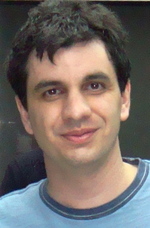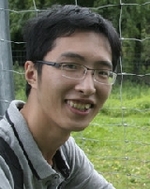About the Authors

Eric Allender
Distinguished professor
Rutgers University, New Brunswick, NJ
allender[ta]cs[td]rutgers[td]edu
www.cs.rutgers.edu/~allender
Distinguished professor
Rutgers University, New Brunswick, NJ
allender[ta]cs[td]rutgers[td]edu
www.cs.rutgers.edu/~allender
Eric Allender
is a professor at Rutgers University. He
has been at Rutgers since receiving his Ph.D. in 1985 at
Georgia Tech, under the supervision of
Kim N. King. While at Georgia Tech, he
was the Backbone of the
Seed and Feed Marching Abominable and he still
plays trombone from time to time. He did his undergraduate work at the
University of Iowa. He is a
Fellow of the ACM, and currently serves as
Editor-in-Chief of
ACM Transactions on Computation Theory.
Circuit complexity, Kolmogorov complexity, and complexity classes are his
main research interests. He and his wife find happiness on the dance floor
and toiling in their garden.

Shiteng Chen
Ph.D. student
Institute for Interdisciplinary Information Sciences
Tsinghua University
shitengchen[ta]gmail[td]com
iiis.tsinghua.edu.cn/shitengchen
Ph.D. student
Institute for Interdisciplinary Information Sciences
Tsinghua University
shitengchen[ta]gmail[td]com
iiis.tsinghua.edu.cn/shitengchen
Shiteng Chen is currently a Ph.D. student at the
Institute for Interdisciplinary
Information Sciences,
Tsinghua University,
advised by Periklis Papakonstantinou. He did his undergraduate studies in
the pilot computer science program at
Tsinghua University, the “Yao class.”

Tiancheng Lou
Software engineer
Google Mountain View
tiancheng[td]lou[ta]gmail[td]com
iiis.tsinghua.edu.cn/tianchenglou
Software engineer
Google Mountain View
tiancheng[td]lou[ta]gmail[td]com
iiis.tsinghua.edu.cn/tianchenglou
Tiancheng Lou is currently with Google.
He received his Ph.D. in 2012
from the Institute for
Interdisciplinary Information Sciences,
Tsinghua
University under the supervision of Professor
Andrew C. Yao.
He holds numerous programming contest awards.

Periklis A. Papakonstantinou
Assistant professor
Institute for Interdisciplinary Information Sciences
Tsinghua University
papakons[ta]tsinghua[td]edu[td]cn
iiis.tsinghua.edu.cn/~papakons
Assistant professor
Institute for Interdisciplinary Information Sciences
Tsinghua University
papakons[ta]tsinghua[td]edu[td]cn
iiis.tsinghua.edu.cn/~papakons
Periklis A. Papakonstantinou is an assistant professor at the
Institute for Interdisciplinary
Information Sciences,
Tsinghua University.
He took up this appointment (in 2010) immediately after some wonderful
years
at the University of Toronto, where he
had the privilege of being part of a
great theory group. During his
Ph.D. at the University of Toronto he read
theory of computing and cryptography with his advisor
Charlie
Rackoff, whose teachings
contributed to his deep appreciation for concepts in Computer Science.
Significant influence on his research identity and taste comes from his
teachers
Gábor Pete and
Balázs Szegedy
(from studies in mathematics at the University of Toronto),
and Stavros Cosmadakis (from his engineering studies at the
University of Patras in Greece).
His current research interests are in the foundations of computer science
(at large),
and he has a more than occasional interest in Cryptography and Machine
Learning.
In his early youth he enjoyed riding motorbikes and collecting
graduate degrees.

Bangsheng Tang
Associate researcher
Hulu, Beijing Office
bangsheng[td]tang[ta]gmail[td]com
tang.bangsheng.info
Associate researcher
Hulu, Beijing Office
bangsheng[td]tang[ta]gmail[td]com
tang.bangsheng.info
Bangsheng Tang is currently an Associate Researcher at
Hulu,
Beijing Office. He received his Ph.D. in 2013 from the
Institute for Interdisciplinary
Information Sciences,
Tsinghua University,
under the supervision of
Periklis
A. Papakonstantinou. This work was done during his Ph.D. studies.
He did his undergraduate studies in the
first-ever Tsinghua University Special Pilot CS Class, founded by
Andrew C. Yao.
His research interests
include algorithm design, computational complexity and
computational group theory.
